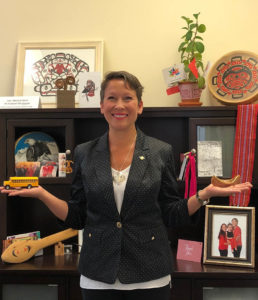PEOPLE IN THE NEWS
Feature Interview with Melanie Mark, BC Minister of Advanced Education, Skills & Training
by Mary P Brooke, Editor, West Shore Voice News

Upbeat and excited to be doing the full scope of her high-profile job as the Minister of Advanced Education, Skills and Training since July 2017, Melanie Mark also proudly carries the role of matriarch as a member of her nation and clan and house. “I take on those responsibilities out of respecting our family.”
“I don’t have a private life,” with all that’s on her plate, she says. “The public doesn’t understand inter-generational trauma” -– something front of mind for Mark for what her extended family experienced through the residential school system.
She is Nisga’a, Gitxsan, Cree, Ojibway, French and Scottish and a proud mother of two girls – Maya, 15, and Makayla, 7.
Melanie Mark was appointed Minister of Advanced Education, Skills and Training on July 18, 2017. A lifelong champion of children, youth and her community, she was elected MLA for Vancouver-Mount Pleasant in 2016 and re-elected in 2017. She is the first female First Nations Member of the Legislative Assembly of British Columbia and the first female First Nations Cabinet Minister.
On a typical day there are meetings, travel and public appearances. In the evening — sometimes quite late — she’ll get calls from former youth in care who she has taken under her wing. She also recently married.
What keeps her going? “I had such an allergic reaction to injustice, I want change. I get lit up when I have a feeling that something’s just wrong,” Minister Mark told West Shore Voice News this week.
Saying she’s always been known for “having a big mouth and seeing through a glass half full” has given Mark the “courage to stand up against the storm”. If something’s wrong, her response is: “What are we going to do about it?”
First chatting with Ms Mark at the Royal Roads University (RRU) grad scholarship funding announcement June 26 in Colwood, it was an opportunity to ask about the setbacks that propelled her forward. She also talked about maintaining her broader family ties even thought they “see her as different” as she propels ever forward in the mainstream society that originally held the source of her oppression.
She gets comments from relatives like “we’re not like you”, and from a First Nation chief (who refered to her as a chief) saying she “sits alone” at their leadership table (because she now is a cabinet minister in the mainstream government) and belongs to a ‘different family’, the BC NDP.
So, oddly enough, battling to change the system from within both immerses Mark in a number of sociocultural worlds while also isolating her into somewhat unexpected but powerful silos: an almost 24/7 public eye and being a perpetual fighter within a political system that embraces functional conformity.
Here’s what contributes to her confidence: “Most of my life was not about choices, it was about resilience. I didn’t choose to grow up in poverty. I didn’t choose to be a victim of abuse. I didn’t choose to live in a racist society surrounding me in the workplace and at school,” she fluidly articulated. For Mark, resilience is about never being a passive victim.
What is she doing differently for her daughters? “As a mother I have made a concerted effort to protect my children from abuse.” And she is quick to note that she does not mean abuse from within native community. “Abuse has no name”.
Mark’s early life was one of “a feeling of helplessness”. But she listened to mentors. “I’ve had amazing people in my life that saw things in me that I didn’t see in myself,” she said this week. That included a rugby coach who saw tenacity and courage, a lawyer who saw an advocate, and teachers who saw smarts and intelligence. For her, these leaders “extended the vision of hope”, including “apply for this, try this, don’t quit”.
“I was surrounded by and set up for failure in our society,” said Mark, who grew up in social housing, frequently changed schools, and endured various types of abuse while in poverty. “I am setting up my daughters for possibility and opportunity. I will empower them, but the choices are going to be up to them,” she said.
Some of this powerful understanding of adversity’s damage to the human spirit is of course now beneficial in her work leading the post-secondary education system for the province. Starting with Premier John Horgan’s now well-known mantra that “education is the great equalizer”, she is proud that one of the first acts of the new NDP government last year was to waive fees for adult basic education. And there is now free post-secondary tuition for youth in care, and no fees for English language learning programs.
Particular to the west shore, the Ministry is collaborating with RRU and Sooke School District 62 (SD62) to try and improve the below-provincial-average transfer rates of local Grade 12 grads into post-secondary. One of the solutions could be to offer a variety of unique entry-level courses at RRU so that students can still live at home and avoid some of those initial housing and transportation costs that come with relocating to college or university afar.
This article was first published on page 1 in the August 3, 2018 print/PDF issue of West Shore Voice News
Back to the Education section | Back to the BC current news page | Back to the main page of West Shore Voice News

